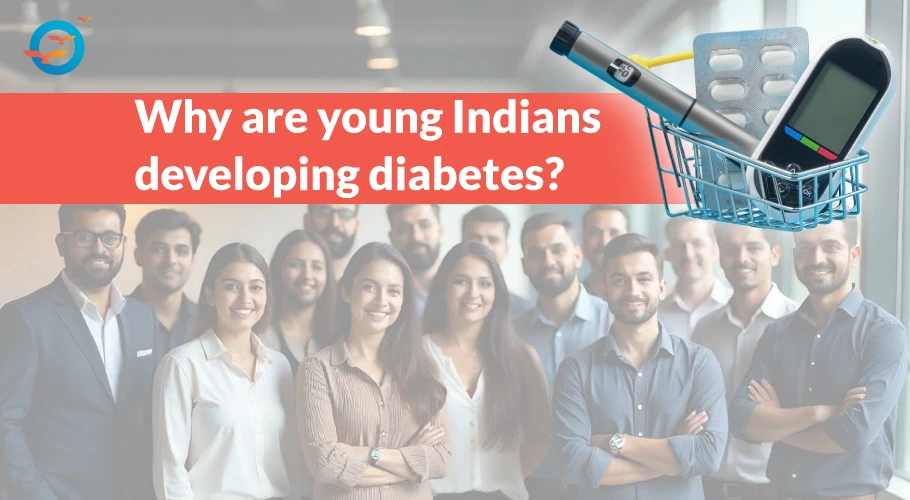Why are young Indians developing diabetes?

Why are young Indians developing diabetes?
Have you ever heard of someone in their 20s or 30s being diagnosed with diabetes and thought, Aren’t they too young for this? Sadly, that’s no longer the case. Across India, more and more young people under 40 are being diagnosed with type 2 diabetes a condition once considered a health risk only for older adults.
What’s driving this disturbing trend? Why is the number of type 2 diabetes in young adults rising? Let’s dive into the causes of type 2 diabetes in young adults and see if any of these sound familiar to you.
1. Diet Shift: From Traditional to Processed – Sound Familiar?
Remember the days of dal, roti, and sabzi at home? Fast forward to now how often do we rely on instant noodles, sugary drinks, and packaged snacks? Over time, our diets have shifted from nourishing home-cooked meals to fast, processed, and sugar-loaded options. These foods have a high glycemic index, meaning they spike blood sugar quickly leading to insulin resistance.
Think about it: How often are you eating real food vs. packaged stuff?
2. Sitting is the New Smoking: Sedentary Lifestyle & No Movement
Are you spending hours in front of a screen be it a laptop, TV, or mobile? If yes, you’re not alone. Long office hours, online classes, and binge-watching have drastically reduced daily movement. Lack of physical activity doesn’t just add kilos it directly affects how your body uses insulin.
When was the last time you went for a brisk walk or broke a sweat?
3. Hidden Fat, Visible Risk: Obesity & Visceral Fat
Did you know you can have a normal weight and still carry dangerous fat around your organs? It’s called visceral fat, and it’s more common in young Indians than you’d think. This fat releases harmful chemicals that trigger inflammation and insulin resistance.
Even if you’re not overweight, do you carry extra fat around the belly?
4. Burnout Nation: Stress & Sleep Deprivation
Late nights, work deadlines, academic pressure stress has become the norm. But it’s not just mental; stress raises your cortisol levels, which messes with your sugar control and fat storage. And let’s not forget: poor sleep only adds fuel to the fire.
How many hours of sleep did you get last night and was it restful?
5. Early Insulin Resistance: Puberty & PCOS in Girls
Did you know puberty naturally causes temporary insulin resistance? Now combine that with junk food and inactivity, and you have a problem. Among girls, conditions like PCOS closely tied to insulin resistance are being diagnosed earlier than ever.
Are you aware of the signs of PCOS or irregular cycles in teens? It’s worth checking.
6. The Invisible Epidemic: Lack of Awareness & Delayed Diagnosis
Most young people don’t even consider diabetes as a possibility until it’s too late. Many go undiagnosed because symptoms are ignored or misattributed to stress or fatigue.
When was the last time you got your blood sugar checked even just out of curiosity?
7. Culture, Convenience, and Choices: Socioeconomic & Lifestyle Factors
Western food habits are now deeply rooted in Indian society pizza, burgers, soft drinks, and snacks are the norm. Add a lack of health education and limited access to healthy food in many areas, and you’ve got a recipe for trouble.
Are we teaching our kids more about mobile phones than about mindful eating?
So, What Can We Do About It?
The Way Forward: Prevention & Policy Interventions
Let’s be honest reversing this trend requires more than just individual willpower. Schools and colleges need to introduce health-focused programs: regular fitness classes, nutrition education, and mental well-being workshops. Parents and families should be empowered with tools and knowledge to support healthy habits at home. And policy-makers? They must push for clearer food labeling, regulate sugar-heavy products, and ensure healthier food options are affordable and accessible.
Conclusion: Time to Take Charge
So what have we learned? That early-onset diabetes in young Indians is real and rising. Poor diet, lack of exercise, stress, sleep deprivation, and limited awareness are all part of the problem.
But here’s the good news: It’s preventable. With timely lifestyle corrections, early screening, and awareness, we can turn the tide. Whether you're a young adult, a parent, a teacher, or just someone who cares your role matters.
Take the first step: Get informed, get tested, and get moving.
Let’s change the narrative before diabetes changes us.
Read more about the Is Vitamin D3 key to diabetes control?, visit our blog.
FAQs
Why are more young Indians getting diabetes?
Due to unhealthy diets, sedentary lifestyles, stress, and lack of awareness, more young Indians are developing type 2 diabetes.

